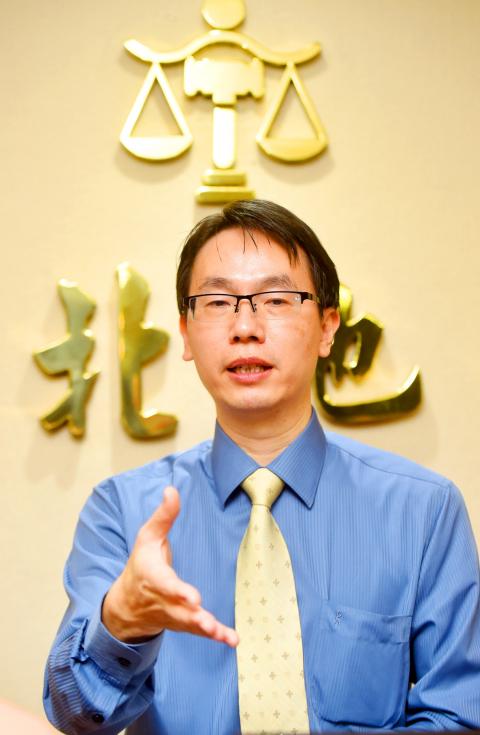The Taipei District Court yesterday acquitted 22 defendants involved in the 2014 Sunflower movement in the first ruling on the case, saying the defendants had legitimate reasons for breaking into the Legislative Yuan on the night of March 18, 2014, based on the principle of “civil disobedience.”
The verdict concerns actions on that day by 22 defendants, including Lin Fei-fan (林飛帆), Chen Wei-ting (陳為廷), Huang Kuo-chang (黃國昌) and Wei Yang (魏揚), who led the protesters or were found to be among the first groups who led protesters through the legislature’s gates, which were being guarded by police officers. The 22 stood trial on charges of inciting others to commit a crime, obstruction of police officers in the discharge of their duties and other crimes.
Taipei District Court Chief Judge Liao Chien-yu (廖建瑜) said the panel of three judges made investigative inquiries, and reviewed theories and practice surrounding the concept of civil disobedience, through literature and research findings on the topic by both Taiwanese and international academics and experts.

Photo: Chien Jung-fong, Taipei Times
The judges studied the concept so that they would be better able to weigh defendants’ and their lawyers’ arguments that their reasons for storming the legislature were legitimate and socially justifiable, because it was an attempt to block the cross-strait service trade agreement, which was being rushed through the legislature by Chinese Nationalist Party (KMT) legislators without consulting the people, Liao told a news conference.
Liao said the judges had summarized the findings and found that the concept of civil obedience rests on seven main requirements:
“Protest activities must be aimed at illegal or unjust actions of major proportion in government or public affairs; activities must be inspired by concern for the public’s interest or have public affairs objectives; the protest activity must recognizably have direct bearing on the subject of the protest; the action should be performed in the public sphere and be non-violent in nature; actions should aid in achieving the stated objective; they should conform to the necessity principle, where there is no other legal and effective means toward the objective; and to the proportionality principle, where the resulting damage should be less than that resulting from the protest and its stated objectives,” he said.
The judges reached their assessment by carefully considering each of the requirements for civil disobedience, looking at the legislative process of tabling the bill for the ratification of the cross-strait service trade agreement, procedures for review by legislative committees, negotiations between the political parties, and approval of the bill through votes in the legislature, according to the ruling.
“It was found that Huang Kuo-chang and the other defendants’ occupation of the legislature on March 18 was in accordance with the seven major requirements for civil disobedience. Also that during nearly a month of occupation, the legislature did not make active efforts to remove the protesters, had attempted to engage in dialogue with protesters, and did not express a wish to press charges through the judiciary during or after the occupation,” the ruling said.

NATIONAL SECURITY THREAT: An official said that Guan Guan’s comments had gone beyond the threshold of free speech, as she advocated for the destruction of the ROC China-born media influencer Guan Guan’s (關關) residency permit has been revoked for repeatedly posting pro-China content that threatens national security, the National Immigration Agency said yesterday. Guan Guan has said many controversial things in her videos posted to Douyin (抖音), including “the red flag will soon be painted all over Taiwan” and “Taiwan is an inseparable part of China,” while expressing hope for expedited “reunification.” The agency received multiple reports alleging that Guan Guan had advocated for armed reunification last year. After investigating, the agency last month issued a notice requiring her to appear and account for her actions. Guan Guan appeared as required,

A strong cold air mass is expected to arrive tonight, bringing a change in weather and a drop in temperature, the Central Weather Administration (CWA) said. The coldest time would be early on Thursday morning, with temperatures in some areas dipping as low as 8°C, it said. Daytime highs yesterday were 22°C to 24°C in northern and eastern Taiwan, and about 25°C to 28°C in the central and southern regions, it said. However, nighttime lows would dip to about 15°C to 16°C in central and northern Taiwan as well as the northeast, and 17°C to 19°C elsewhere, it said. Tropical Storm Nokaen, currently

PAPERS, PLEASE: The gang exploited the high value of the passports, selling them at inflated prices to Chinese buyers, who would treat them as ‘invisibility cloaks’ The Yilan District Court has handed four members of a syndicate prison terms ranging from one year and two months to two years and two months for their involvement in a scheme to purchase Taiwanese passports and resell them abroad at a massive markup. A Chinese human smuggling syndicate purchased Taiwanese passports through local criminal networks, exploiting the passports’ visa-free travel privileges to turn a profit of more than 20 times the original price, the court said. Such criminal organizations enable people to impersonate Taiwanese when entering and exiting Taiwan and other countries, undermining social order and the credibility of the nation’s

‘SALAMI-SLICING’: Beijing’s ‘gray zone’ tactics around the Pratas Islands have been slowly intensifying, with the PLA testing Taiwan’s responses and limits, an expert said The Ministry of National Defense yesterday condemned an intrusion by a Chinese drone into the airspace of the Pratas Islands (Dongsha Islands, 東沙群島) as a serious disruption of regional peace. The ministry said it detected the Chinese surveillance and reconnaissance drone entering the southwestern parts of Taiwan’s air defense identification zone early yesterday, and it approached the Pratas Islands at 5:41am. The ministry said it immediately notified the garrison stationed in the area to enhance aerial surveillance and alert levels, and the drone was detected in the islands’ territorial airspace at 5:44am, maintaining an altitude outside the effective range of air-defense weaponry. Following